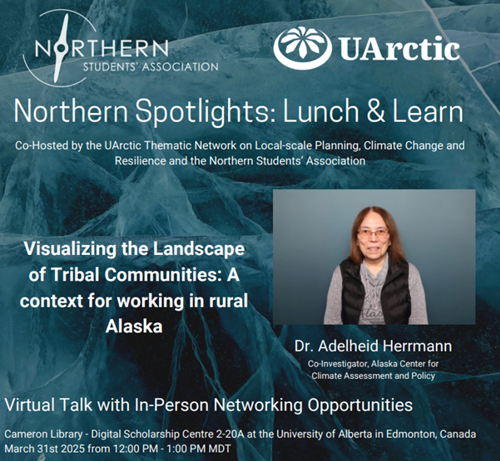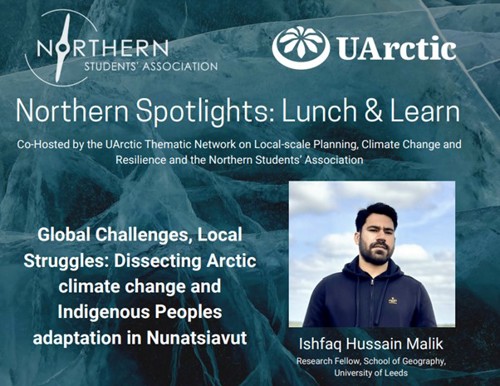By Jeff Birchall
The UArctic Thematic Network (TN) on Local-scale Planning for Climate Resilience was created in 2019. The TN was conceived with the understanding that planning at the local-scale is critically important, given that decision-makers there represent both the level of government closest to the impacts, but also the communities (the people) directly affected by the changing climate.
With this in mind, the goal of TN is to explore how communities confront climate change, including assessment of governance structures around climate adaptation processes, and how they seek to adapt to emerging challenges arising from increases in temperature and more extreme weather events. Through the TN’s activities, we aim to facilitate a better understanding of local expertise and highlight, in particular, the value a community planning perspective brings to discourse on climate resilience, and shed light on local government decision dynamics around motivational factors and extent of planning for climate resilience.
The vision of the TN is to work collaboratively with local actors and key stakeholders to identify current and future environmental challenges, and to scope how activities through the TN can assist communities increase their resilience to the impacts of climate variability, be it through the co-development of policy approaches, on-the-ground action implementation, research capacity and/ or knowledge mobilization, for example. A key aspects of this TN is that it works within and across scales from larger urban centres to small communities, including attention to Indigenous forms of community planning for climate resilience.
Recently, the TN has dedicated attention to three important areas of activity: Education; Collaboration; and, Research Dissemination. Below, these areas, and examples of activities are discussed.
The TN and Live It Earth, supported by a Global Affairs Canada/ UArctic grant, partnered to create a bilingual (English/ French) educational program featuring climate stories of resilience and adaptation. Called Arctic Communities, the project hones in on the Canadian community of Tuktoyaktuk, Northwest Territories, and engages Inuit youth in order to understand, from their perspective, how climate change influences their daily lives. The program draws on expertise of graduate students from the Climate Adaptation and Resilience Lab (University of Alberta) and the broader membership of the TN. Hosted by Live It Earth, the program (video and supplementary resources) is currently distributed to K-12 students across Canada. The program also included a digital ‘pen pals’ component, which facilitated connections between Northern and Southern Canadian students.
Building off this program, and with the support of a Global Arctic Leadership Initiative grant, the TN and Live It Earth organized a panel and workshop at Arctic Congress 2024 (Bodo, Norway), in order to brainstorm how to collaboratively develop a locally-centred and student-focused education program on environmental change and resilience across the Arctic more broadly. We brought together scholars involved in circumpolar education related to environmental change and resilience from across the UArctic TN and Institutes. The panel included five scholars, from three countries (Canada, Norway, USA, including Iñupiaq perspectives), representing the following UArctic-affiliated groups:
Panelists reflected on experiences/case studies and challenges they have observed related to education in their specific contexts. After the panel, panelists and members of the audience were invited to participate in moderated discussions. Three groups were formed, to represent key themes from the panel: 1) Circumpolar education research and policy priorities; 2) Co-creation and participatory approaches in education; and, 3) Decolonization of Western education. Outputs from the panel/ workshop include a short article in UArctic’s Shared Voices, and a peer-reviewed journal article and info-graphic, both currently in development.

The TN is collaborating with the High North Center, Nord University and the Belfer Center Arctic Initiative, Havard Kennedy School, to develop an edited book on “What it means to be resilient: Lessons from the Arctic”. Chapters reflect a diversity of case studies/ stories about resilience in the Arctic, from resource development related accounts in Russia, to managed relocation in the face of environmental hazards in Canada. Ultimately, the intent is to showcase how resilience manifests in the Arctic, how resilience is an evolution through time and context. Chapter snapshots will be presented in June, with final drafts due later in the Fall.
The TN is also collaborating with the scientific journal PLOS-Climate to deliver a series of webinars on Arctic climate adaptation and governance related themes. The inaugural webinar, 'Exploring climate adaptation in northern communities', took place this past April and featured speakers from Russia/ Finland, United States, and Denmark, and honed in on adaptation from across local sectors; including local infrastructure/ utilities, local economy, and local governance. In this regard, panelists explored how adaptation is conceived, and offered insights for bolstering implementation in practice– demonstrating how to leverage enablers, and overcome constraining factors at the local scale. A short article that captures the themes shared in the webinar, along with attention to broader global implications, is being developed for publication with PLOS-Climate.

Through the virtual (Zoom) Graduate Student Seminar Series, the TN has been active in supporting students to disseminate their research. Since 2021 the TN has hosted 8 3-hour sessions, each including presentations by 4-6 students, a moderated discussion facilitated by a TN partner, and a dedicated audience engagement component (for Q&A). Presenting students generally come from TN partner institutions, including from
Topics explored vary, though broadly relate to the focus of the TN, including for instance:
In addition to providing a venue to share research results, the series includes a workshop component, where TN partners provide constructive feedback on the presentations, and work with the students to hone ideas further. Ultimately, the aim in delivering the series is to provide a relatively low key and low stress environment for students to engage an international audience of scholars and receive feedback on their work.
Along a similar vein, the TN also hosts a Speaker Series, where more established scholars (though still with a focus on early-career) share their research. In order to draw students to these sessions, the TN has partnered with student groups at the University of Alberta, including the Geography and Planning Students Society (GAPSS) and the Northern Student’s Associate (NSA). Since 2022 the TN has hosted 10 sessions, with speakers from Canada, Norway, UK, USA. Talks included:


Read more about all the activities hosted or facilitated through the Thematic Network on Local-scale Planning for Climate Resilience.